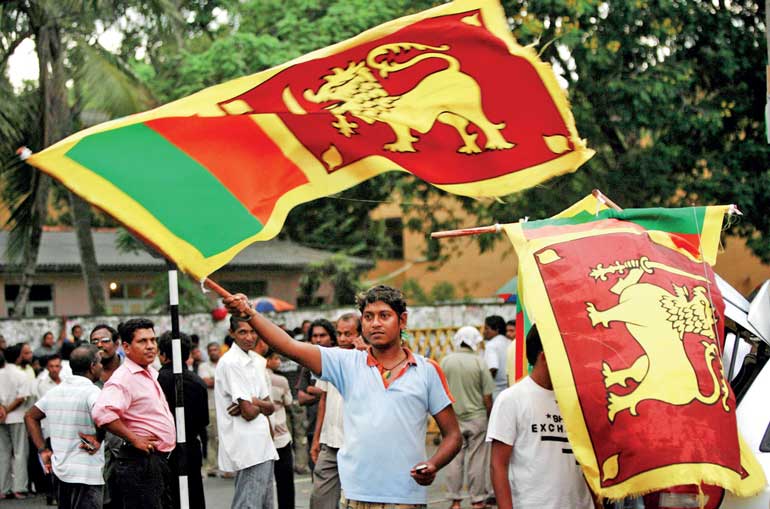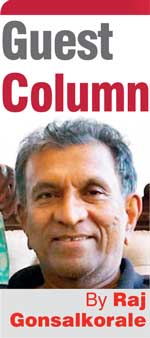Saturday Feb 28, 2026
Saturday Feb 28, 2026
Wednesday, 2 February 2022 00:00 - - {{hitsCtrl.values.hits}}

Independence is defined as a condition of a person, nation, country, or state in which residents and population, or some portion thereof, exercise self-government, and usually sovereignty, over its territory. The opposite of independence is the status of a dependent territory (Wikipedia)
Sri Lanka has been a sovereign State which has exercised self-governance since 1948.
Sri Lanka celebrates its 74th year of being such a State on 4 February. Serious questions however need to be raised as to how truly “independent” the country is and how in “dependent” it is after 73 years. In the context of its dependence, one could argue that it is a State that is opposite to an independent State.
raised as to how truly “independent” the country is and how in “dependent” it is after 73 years. In the context of its dependence, one could argue that it is a State that is opposite to an independent State.
Sri Lanka is hugely in debt, with its government debt said to be 101.5% of its GDP with the foreign debt component exceeding 62%. From memory, the last time the country had a balanced budget was in 1972 when Late Dr. N.M. Perera was the Finance Minister in the government of Prime Minister Sirimavo Bandaranaike. Since then, the country has been increasingly spending more than what it has earned and merrily living beyond its means.
The country should question whether it should be celebrating its independence or should lament its dependency to foreign governments, lending agencies, both local and foreign, and sovereign bond holders, and also lament the lack of a planned, structured, economic vision that would have freed the country from its dependencies.
The responsibility for this state of affairs lies with all who have governed independent Sri Lanka since 1948. No doubt some more than others. Considering the financial state of the country today, this is a statement of fact and not a politically motivated criticism of one side or another who have governed the country.
No doubt, for the sake at least of the generations to come, one has to have hope that at least at this late stage, 73 years later, some responsible people will come up with a sensible economic plan. A leading businessman, Dhammika Perera in a recent interview has proposed a 7-point plan for the country to earn its foreign exchange needs. Besides him, several others too have proposed immediate, medium-term and long-term solutions to take the country forward.
It is perhaps time to save the country from politicians and allow the business community, academics and other professionals to meet and develop an economic development plan, at least a 10-year plan with immediate, medium-term and long-term strategies, and appoint an implementation team to implement the plan without having any engagement with politicians in the task of implementation. One could call it an economic coup d’etat, but if life is allowed to proceed as it is, such a coup d’etat might be the only thing that might save the country from becoming a hell hole for its people.
Hope no doubt must spring eternal. No individual or a country can move forward without hope. Sri Lanka, like many other countries have been affected by COVID and still is and continues to get affected as COVID has not finished its business. Sri Lanka has lost at least 50% of its foreign revenue in 2020 and 2021, and it is facing a major challenge in repaying its foreign debts while scrambling to find foreign currency to fund essential imports. Despite this perilous situation, Sri Lanka has to have hope about its future.
The impact of COVID is underestimated by many and whatever government in power at this time would have had to face challenges arising from the pandemic. The high level of foreign debt, now reportedly exceeding 60% of GDP, and exacerbated by a short-term, high interest sovereign bond component amounting to 45% of the total foreign debt, has crippled the country. These borrowings are cumulative and not the work of one government, but successive ones over the years. This situation along with the lowering of the country’s credit rating by all credit rating agencies, have made the impact of COVID much greater than it would have been had Sri Lanka been on a better economic footing.
Contd on page 12
There are lessons to be learnt from the mistakes and misjudgements made in managing the economy of the country. Unfortunately, the feigned wellbeing and “all is well and will be better soon” attitude of the political hierarchy and their advisers, and the curtailment of the freedom for those who wish to make differing views within the public service, seems to have made Sri Lanka a country run by a breed of politicians and bureaucrats who do not seem to see beyond their noses and unable to see and feel the ground beneath them.
This article is about the major fundamental challenges that the country is facing and their effects felt by many ordinary people and which do not seem to be understood by many politicians and bureaucrats. Some of these challenges are the result of cumulative governance shortcomings of successive governments.
Lack of law and order and corruption leads the list of challenges that face the country, while mismanagement trails very close to these. Sri Lanka seems to have a law and order net that allows whales and sharks to escape and roam free but which catches sprats and even smaller fish and punishes them with harsh sentences even for minor offences. Throughout the country’s post independent history, it has yet to convict and punish persons in high political and administrative positions. In recent times, whales and sharks responsible for the Bond scam and the Easter bombing incidents, just to name two major incidents, still roam free, while if one scans the country’s newspapers, there are plenty of reports on relatively small fish being convicted of offences which pale into insignificance compared to many of the major scams and crimes.
Law enforcement and justice is selectively applied and the general unwritten and well understood rule about the application of the law and justice is that the rule is based on “who you know and not what you know” and that there are “some who are more equal than others”.
Today, the cancer of corruption has reached a state where one rarely hears about people who are not corrupt. Rumours and hearsay about the level of corruption at the highest levels in the country has led many to take the view that there has to be some fire for so much smoke to emanate within the society.
As some measure to allay the generally felt and widely accepted view about corrupt politicians, all politicians from the highest office downwards should make public their statement of assets and liabilities, which they are required to do as per the Constitution anyway, so that people could discern fact from fiction, if indeed what is disclosed is fact and not fiction.
If one cares to talk to ordinary people of the country, they will relate their experiences of Police indifference and ineffectiveness, and how the law applies differently to different people in the country, especially to politicians and their close supporters. There are more and more stories about complaints made to the Police on numerous incidents that affect very ordinary people and which have gone unattended or even dismissed without any investigation, and also about the time such ordinary people spend trying to seek justice for offences committed at grassroots level.
Much of the debate and discussion going on about the technical reasons for the economic catastrophe that the country is experiencing now is of no interest to millions of ordinary people. Their natural concern is about shortages of food and other essential commodities, the high prices they have to pay for whatever is available. The political leadership of the country is yet to explain in ordinary lay persons language why the country is in such a perilous situation. Little do they realise that they have pawned the future generations of the country without any plan as to how they are going to free them from such a bondage.
To make matters absolutely worse, the one commodity that impacts on virtually everyone in the country, the supply of LP gas, has been so badly handled and inconvenienced people, and worse, placed the safety of many people at risk.
The other related issue is the mismanagement of the fertiliser saga. Despite the advice of many eminent experts in Agriculture, the political leadership decided to introduce an impractical and potentially harmful policy, harmful to the food security and the economy of the country.
The list of blunders is long. In terms of the much-needed investments, if the environment that results is one of mistrust, the hollowness of words and assurances, even outright lies, then, what it produces is a lack of confidence amongst possible investors who would rather keep their money under their pillows rather than invest in Sri Lanka.
No doubt one must live with hope. But, when the obstacles to hope appear insurmountable, hope turns to despair. On the eve of independence, after 73 years of it, there is more despair than hope.